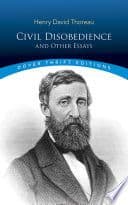
Civil Disobedience:
And Other Essays
Thoreau has inspired generations of readers to think for themselves and to find meaning and beauty in nature
DIFFICULTY
intermediate
PAGES
96
READ TIME
≈ 200 mins
DIFFICULTY
intermediate
PAGES
96
READ TIME
≈ 200 mins
About Civil Disobedience
When the law makes you an agent of injustice, conscience owes the state a principled “no.”
In Civil Disobedience, Thoreau turns that conviction into a method: refuse to fund wrongdoing (even through taxes), accept the penalty, and let a night in jail count as a public vote. Companion essays deepen his argument: Slavery in Massachusetts indicts civic complicity; Life Without Principle skewers a culture that sells time and integrity; Walking shows how wild places restore independent judgement; A Plea for Captain John Brown asks how far moral courage must go. Thoreau’s prose is flinty and clear—part field notebook, part manifesto—calling for simpler lives and accountable action.
This slim book offers a usable template for ethical resistance—and the everyday practice of freedom.
What You'll Learn
- Thoreau’s case for obeying conscience over unjust laws
- Noncooperation as a practical, ethical strategy
- The moral legitimacy of government and taxation
- How simplicity and self-reliance support civic integrity
- Connect nature, solitude, and moral clarity in social action
Key Takeaways
- Conscience outranks unjust law
- Action matters more than ballots
- Refuse complicity with injustice
- Simplicity empowers autonomy
- Nature sharpens moral vision

